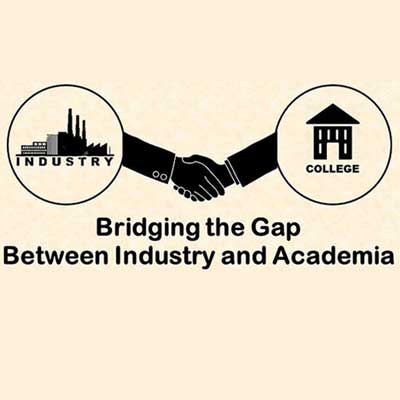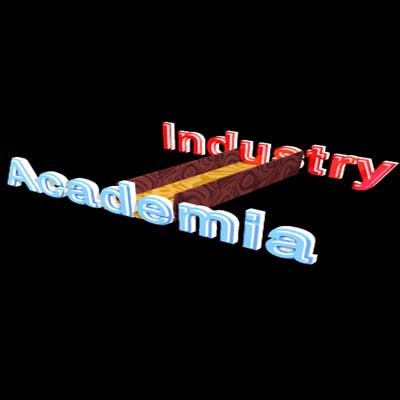Academia and Industry- How to bridge the gap? | Aparna Sharma | Senior HR Professional & Certified Corporate Director I Editor’s Collection
 Necessity drives inquisitiveness. Industry and academia collaboration is a must for the overall development of the youth and the country. Industries demand new and developing skills so that they can compete in the demanding global market. However graduates from various streams are coming in Lacs, and a sizable number of students remain unemployed due to gaps in skills and expectations.
Necessity drives inquisitiveness. Industry and academia collaboration is a must for the overall development of the youth and the country. Industries demand new and developing skills so that they can compete in the demanding global market. However graduates from various streams are coming in Lacs, and a sizable number of students remain unemployed due to gaps in skills and expectations.
Lots of investment and planning is done by Government sectors in terms of skills required by industry vs number of colleges vs specialized subjects and cost investment to enable these institutes to deliver better results. However, it is inadequate to address needs of the corporate world. Government, Industry and universities should be able to coordinate to minimize the cost, time and the waste so that they work in same direction and with similar perspective.
SKILL GAPS
It is not that the number of colleges for any field in India is less or there are fewer opportunities to grab. The numbers of colleges are increasing while quality is deteriorating. Today’s industry is looking at innovative solutions in minimum cost and less effort. From my personal experience, if one were to hire freshers in any IT company from Engineering institutes, when students are given a real time scenario and asked to create programs for the same, they are unable to do so. The mindset observed is that, they understand only the code or programs which are taught in the curriculum but not able to apply the same in actual scenarios. They understand them conceptually but ability to apply to real life scenario is lacking. Likewise in Computer science, there is a subject on data structures and students learn it literally by definition and they don’t know where it will be actually applied in real world. Expression of students to explain the solution is also lacking with respect to communication skills.
Observable Gaps between Industry and Academics –
1. Curriculum is not keeping pace with current technology and demand of industry
2. Focus of universities and institutes are more on academics and less on practical application
3. No Exposure of industry is given for setting up real life expectation in terms of salary, timings and mobility
4. Mind set of students that knowledge earned from degree is sufficient to survive in corporate world
5. The Faculty is demotivated and it affects the quality of education overall
6. Even though practicals or project work is there in current curriculum but it is not evaluated on quality parameters. In Industry, if any project is assigned to an employee, it will be measured for quality and productivity in the given timeline.
7. Also, students do not give much value to practicals because the % of marks assigned for practicals is less than theory.
8. Soft Skills development are not covered in the curriculum of many institutes. (a) Attitude, commitment and ownership (b) Reasoning and learning ability (c) Communication skills (d) Team spirit (e) Innovation skills.
As soon as a student steps out of college, he/she aspires to gain a lot from his qualification. But actually that is not the case. The rejections in placements happens because of perception gap between employer and prospective employee (student).
WHY DISCONNECT
The Institutes work more on distribution rather than generation of knowledge:
• Marks distribution between laboratory/Practical and theory for a subject is ~80:20. Students are always focused on the theory part to score better grades. Also, all competitive exams focus on theoretical knowledge.
• Infrastructure gaps in Institutes
• Industry connect on regular basis – Institute can take advantage of field experience from industry through projects, guest lectures and seminars.
• Curriculum upgrade – Slow/No revision and upgradation of books as per evolving techniques or technology
• Skill requirements are challenging and are ever evolving. Institutes need to catch up, so that faculty & students remain up-to-date
• Faculty of colleges mostly lack industry experience which in turn results in poor quality of practical education in institutes.
INSTITUTES’ VIEW POINT –
Many industries are providing skill up training only after candidate joins the organization instead of supporting in project work or internships during the course of study. This further increases the cost to company as the skilling up is done after employment.
• Industry also has to contribute in bridging the gaps as ultimately they are the beneficiaries and the country as a whole.
Industry should contribute to the following:
– Frequent Visiting Faculty Support and Interaction programs – Currently, many institutes have visiting faculty program. It can be made more effective by organizing working session with students, making these sessions interactive, and sharing of industry practices and problems.
– Industries to facilitate internship programs.
– Giving Back to own College – There should be some way to give feedback from the recently passed out students either through social media or quick talk session with students sharing their personal experience in industry and problems faced by them.
– Feedback system from Industry to Universities – Universities are not getting feedback from industry for new joiners. There should be a mechanism to communicate feedback or gaps found in new joiners to the respective institutes. This will help institutes to improve.
– Categorizing the student’s aspirations – There should be a mechanism to identify the students’ aspirations for future role. For example, students who wish to join industry may be clubbed in One category and the students aspiring to move to academics can form another category. According to their interests, practical/On-Job Training should be defined for them.
INDUSTRYS’ VIEW POINT
Improvement Areas in Institutes
• Emphasis on soft skills – Students need to be inculcated with the skills like communication, passion to learn, commitment.
• Awareness towards Industry environment: Students should be well aware of industries work environment and the matrix used to measure employee performance.
• Like defense services trainings or ITI trainings are work oriented which results in better utilization of personnel. Same pattern can be applied in educational institutes for practical’s/laboratories.
• If we go by practices in medical collages, they also have almost 1 year of internship and after 2nd year of college, actual hospital visit and learning practical applications. Same should be applied to industry.
• Infrastructure of workshops and Labs should be at par with the latest developments.
Curriculum
• Curriculum should be finalized in consultation with industry experts.
• Live case studies should be brought to institute/s to understand applicability better.
• Case studies should include Indian conditions or scenarios also and should be upgraded from time to time. Visiting faculty can contribute to guide in working sessions.
• Practical and theory % distribution should be 50:50.
Faculty
• Teacher is an idol for students and every student expects answers or guidance from them. It is very important that teachers should have that practical/industry experience themselves.
• Faculty should have good interpersonal skills for better connect with the students.
New Technologies Skill Development
• Universities should start short duration programs on upcoming technologies. For example, on Big Database, Cloud computing, IOT etc. This will help students to upgrade themselves as per current demand.

SUGGESTIONS TO BRIDGE THE GAP
Revision & Alignment of Curriculum with Industry requirements
It’s time to ascertain gaps in curriculum to make it more practical. This can be achieved through involvement of industry specialists while devising the curriculum. This shall not be a one time activity but shall be a continuous brainstorming activity. In fast paced global village, nothing is constant.
Industry exposure
It shall be mandatory for the graduates to have industry exposure, for example, Summer, Winter Internships etc. While academia can argue that internships are already in place but in most of cases this model is not effective. While for academia, it’s just a formality; for industry, these interns are mostly restrained to clerical activities ranging from filing of documents to setting up racks at day end. In rare case scenarios, they gain relevant practical knowledge. This needs to be addressed with more rigorous controls from academia towards monitoring interns as well as setting key objectives for industry to be delivered during internships.
Industry-experienced teachers & professors
Gaining industry experience shall not be limited only to students, it must be compulsory for the teachers and professors to have relevant industry experience. I believe that theory has its own worth but without practical exposure it cannot be translated into real life scenarios.
In addition, academia must invite industry professionals with relevant subject knowledge to share practical insights with students. This activity must be done regularly.
Incubation centers
It would help each university to have its own startup incubators, whereby students can be given an opportunity to share and test ideas under supervision of not only academia but also industry professionals. They shall be provided with relevant resources, financial or otherwise. This can ultimately not only broaden horizons of an individual but can improve Institutes ranking multifold.
Entrepreneurship and Commercial Viability
Technical knowledge can be bridged with business knowledge. No technical project can be successful without a business case and vice-versa, no project can be successful without analyzing its technical aspects.
Academia must devise courses in a way that this gap can be addressed. Business graduates shall be able to understand technical aspects and vice versa.
Academic Research
Academic research needs to be tuned towards bridging the gap between knowledge producers and knowledge users. Academic researchers need to come up with research papers that are addressing core industry problems and are more practical. Research must not only be focused on developing new ideas & products but also ensure its practical worth.
In short, both academia and industry have to work together to bring in necessary synergies focused towards delivering quality graduates that can play an effective role in economic progression.



